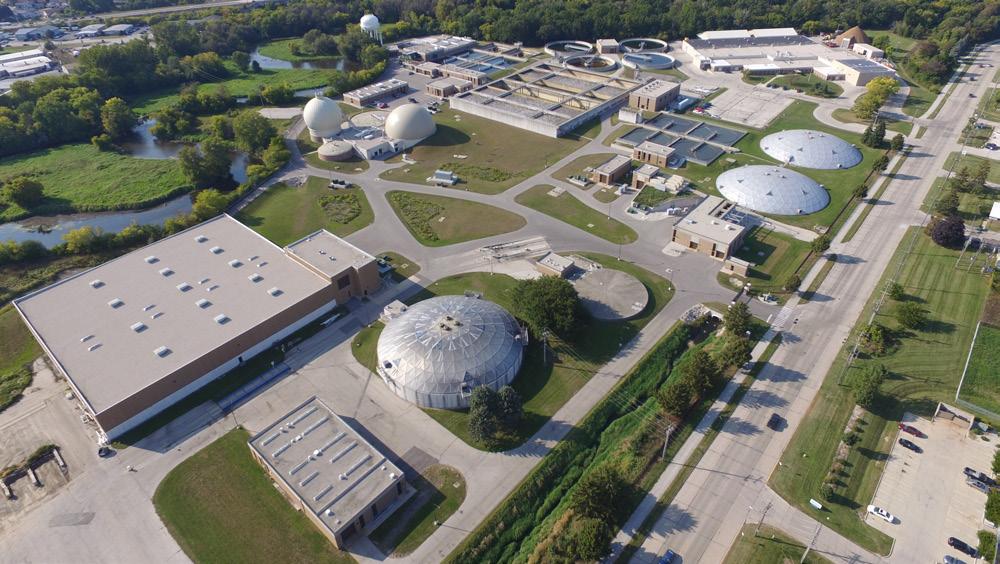
3 minute read
Branching Out
Monarch Butterfly and Other Pollinators
The waning days of summer are upon us and the pollinators are busy gathering nectar for the upcoming winter. These animals are very important to our ecosystem.
Advertisement
What are pollinators?
Pollinators are primarily hummingbirds and insects such as bees, wasps, flies, butterflies, moths, ants, and beetles. Bees tend to be the most important pollinator for many plants in Wisconsin as they feed exclusively on pollen and nectar. For more information on the types of bees native to Wisconsin please see resources at end of article. Recently the Migratory Monarch Butterfly was listed as an endangered species due to habitat destruction and climate change. The Monarch Butterfly is known for its migration from Mexico and California in the winter, to breeding grounds throughout the United States and Canada in the summer. Their breeding ground has shrunk in the last decade due to logging and deforestation, as well as the use of pesticides and herbicides in agriculture. These chemicals kill butterflies and milkweed (which is the Monarch Butterfly larvaes’ primary food source). For more information please visit: https://www.iucn.org/press-release/202207/migratorymonarch-butterfly-now-endangered-iucn-red-list
Why are pollinators important?
Pollinators majorly assist with food crops as crops require or benefit from animal pollination. Some examples include fruits and vegetables such as strawberries, apples, cucumbers and tomatoes that may be grown in your own garden. Pollinators are also helpful for seed production in crops such as carrots, onions and herbs.
How can I attract pollinators and provide friendly habitats?
1. Cultivate Flowering Plants, Shrubs and Milkweed a.Landscape to include flowering plants and shrubs that feed and attract pollinators. Butterfly bushes, lavender, pale purple coneflower and sunflowers are both beautiful for your landscape and helpful for the pollinators. b.Plant pollinator friendly herbs such as spearmint, oregano, basil and catnip. c.Let the milkweed grow or plant it an area to attract the Monarch Butterfly. 2. Provide Nesting Sites a.Most bees nest underground using abandoned rodent tunnels, dead trees and stumps. b.Leave tree and shrub trimmings somewhere on your property as many have bee larvae on them. c.Do not mulch all areas of your yard to provide sites for the bees to tunnel. d.Practice no-till methods by not tilling your garden to keep bee larvae safe so that they can develop into adults. 3. Eliminate Use of Pesticides a.Most plants can tolerate some insect damage. Remember that insects feed on plants, and birds and other wildlife feed on insects. Pesticide residue is harmful to the ecosystem. b.Use non-chemical alternatives such as physically removing pests and placing them in soapy water. Row covers are also an alternative. c.If pesticides are necessary, apply them after the plant has flowered or in the evening as bees are less likely to forage at those times.
What does WPRF do to support pollinators?
• WPRF has planted milkweed on the grounds of the main office. • Both Heyer and Rivers Crossing Parks natural areas are permitted to grow throughout the spring and summer to support butterfly and other pollinators. They are mowed once each fall to keep invasive species under control. • At EB Shurts Environmental Center, in partnership with the School District of Waukesha, native flowers attracting pollinators are being planted around the building. • A Community Butterfly Garden with various plants is also located at EB Shurts. Any community member may donate your own plant by calling our office at 262-524-3737. • Mayor Reilly has participated in the Monarch Butterfly
Pledge for years and has done so again in 2022. WPRF could use your help when you find wasp nests in our street trees or in the parks. The fall is a busy time for bees who seem to love the trash at our park shelters. If there seems to be the nests or lots of bees, please call our main office at 262-524-3737 and we will come and take care of the issue.
Pollinators–whether they are honeybees, butterflies or hummingbirds are important to our ecosystem. We all benefit by supporting their habitats, nesting grounds and using less pesticides. Consider turning your yard into a pollinator oasis.
Below are some resources to get you started:
• dnr.wisconsin.gov/wnrmag/2019/Spring/monarch • nwf.org/mayorsmonarchpledge • dnr.wisconsin.gov/topic/endangeredresources/pollinators.html • hort.extension.wisc.edu/articles/supporting-native-bees-our- essential-pollinators/




